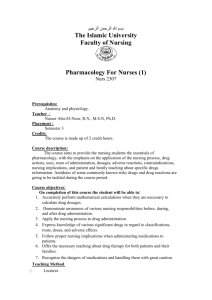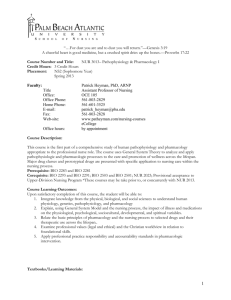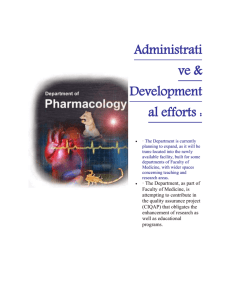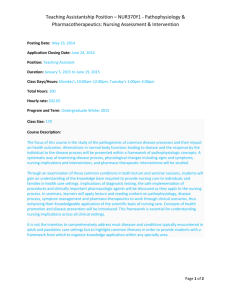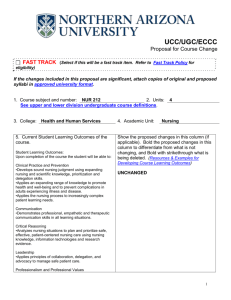NUR 3043 Pathophysiology & Pharmacology II Syllabus
advertisement
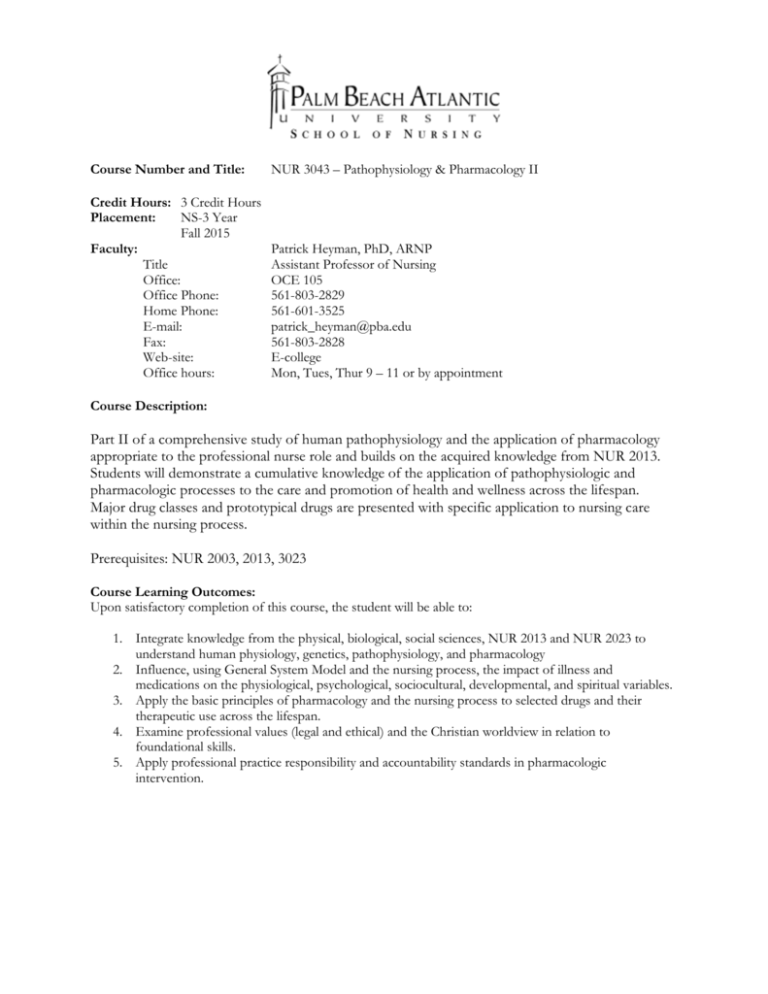
Course Number and Title: NUR 3043 – Pathophysiology & Pharmacology II Credit Hours: 3 Credit Hours Placement: NS-3 Year Fall 2015 Faculty: Title Office: Office Phone: Home Phone: E-mail: Fax: Web-site: Office hours: Patrick Heyman, PhD, ARNP Assistant Professor of Nursing OCE 105 561-803-2829 561-601-3525 patrick_heyman@pba.edu 561-803-2828 E-college Mon, Tues, Thur 9 – 11 or by appointment Course Description: Part II of a comprehensive study of human pathophysiology and the application of pharmacology appropriate to the professional nurse role and builds on the acquired knowledge from NUR 2013. Students will demonstrate a cumulative knowledge of the application of pathophysiologic and pharmacologic processes to the care and promotion of health and wellness across the lifespan. Major drug classes and prototypical drugs are presented with specific application to nursing care within the nursing process. Prerequisites: NUR 2003, 2013, 3023 Course Learning Outcomes: Upon satisfactory completion of this course, the student will be able to: 1. Integrate knowledge from the physical, biological, social sciences, NUR 2013 and NUR 2023 to understand human physiology, genetics, pathophysiology, and pharmacology 2. Influence, using General System Model and the nursing process, the impact of illness and medications on the physiological, psychological, sociocultural, developmental, and spiritual variables. 3. Apply the basic principles of pharmacology and the nursing process to selected drugs and their therapeutic use across the lifespan. 4. Examine professional values (legal and ethical) and the Christian worldview in relation to foundational skills. 5. Apply professional practice responsibility and accountability standards in pharmacologic intervention. Textbooks/Learning Materials: Required: Lehne. (2015). Pharmacology for Nursing Care (9th ed). Saint Louis, MO: Saunders. Nursing Central Software (To sign up, go to nursing.unboundmedicine.com and create an account from a PBA computer. See Nursing Student Handbook for more information.) www.medscape.com Additional Laboratory and Technological Resource • Kaplan Teaching/Learning Methods: 1. Lecture and discussion 2. Computer exercises 3. Case Studies Course Requirements: 1. Read all assigned material prior to class. 2. Attend scheduled classes. 3. Be prepared and participate in the class discussion. 4. Take exams and quizzes. 5. Complete all assignments. Methods of Evaluation: 1. Kaplan Outcome Testing 2. Quizzes and exercises 3. Tests 4. Final examination 5. Kaplan Integrated 6. E-college discussion 5% 5% 60% 30% See below Extra Credit Kaplan Integrated: Pharmacology Test Students must achieve an identified proficiency on the Kaplan Integrated Pharmacology and Parenteral Therapy Test. Passing the Kaplan test partially meets NUR 4710 Nursing Professional Competency requirements. The point allocation is as follows: Scores Greater than 60 percentile 3 % + 1 Extra Credit % 50 – 59.9th percentile 3% 40 – 49.9th percentile 2% 30 – 39.9 percentile 1 % plus NUR 4710 remediation 0 % plus NUR 4710 remediation < 30 percentile Remediation Remediates all questions minimum of 45 seconds per question. To be completed by 2% No remediation or < less than all questions. 0 % /At risk for failing this course. Students who do not successfully pass the Kaplan Integrated Pharmacology and Parenteral Therapy must successfully complete remediation during the following subterm or semester in order to pass NUR 4710. (See SON BSN Student Handbook and NUR 4710 syllabus.) Attendance: Attendance is required. All excused absences from class must be reported. Participation performance will not be penalized for excused absences. Tests will only be made up for excused absences and must be made up within one week. Refer to Student Handbook. Grading Scale: The following grading scale will be used for all School of Nursing courses. Students must achieve a minimum of a C in each nursing course. This course will require a minimum of a 75% average for all examinations to receive a final grade of “C” in the course. Additional assignments listed in the course content will not be included in the required cumulative test grade. Standard rounding rules apply. A AB+ B BC+ C D F 93-100 90-92 87-89 84-86 82-83 79-81 75-78 65-74 64-Below Additional Policies: 1. 2. 3. 4. 5. 6. 1. Attendance is required. Students who are not present on the day of the exam may make it up at 2/3 of the achieved score. Check email and access E-college every day. Students are expected to have completed the required reading and projects in the study guide. In addition, it is expected that students will review, as needed, content from previous courses that has application to the current nursing topics (e.g. anatomy/physiology, pathophysiology, pharmacology, human growth and development, etc.). Students who miss class on the same day of an exam in another course but show up to take the exam will lose all class attendance and participation points. Students found text messaging during classes will be required to leave their phones with the professor during class time for the duration of the semester. The following policies are to be followed according to the current edition of the Navigator: (i) Computer Usage Policy (ii) Dress Code: Standards of Dress and Personal Appearance (iii) Academic Standards of Conduct: for the Community Value System and the Six Core Values of the PBA Community as well as descriptions of infractions of the standards and the discipline process. The following policies are to be followed according to the current edition of the PBA School of Nursing Handbook (iv) Scholarship and Integrity (v) (vi) (vii) Week 1 Professional Behavior and the Care of others Theory, Laboratory, Practicum Attendance and Assignment Submission Students with Disability M: 08/24 T: 08/25 2 M: 08/31 T: 09/1 3 M: 9/7 Off T: 9/8 4 Content Neurologic System Antidepressants, Sedative Hypnotics, Anxiolytics Pain, Sleep, Sensory Function Seizures, Dementia Alterations of Movement Extrapyramidal Motor Syndromes Reading Lehne, 181 – 398 Lewis, 1441 – 1613 Brain trauma Cerebrovascular Diseases Meningitis, Encephalitis Multiple Sclerosis, Myasthenia gravis, ALS, Huntington’s disease Genetics HIV: VoiceThread only M: 9/14 T: 9/15 Test 1 Thyroid, and other Endocrine HRT, OCPs 5 M: 9/21 T: 9/22 Thyroid, and other Endocrince HRT, OCPs 6 M: 9/28 T: 9/29 Diabetes Oral hypoglycemics Insulin 7 M: 10/5 T: 10/6 Renal: Nephrotic Syndrom, ATN, Renal failure Lehne, 436 – 453, 847 – 865 Musculoskeletal: Osteoporosis, Osteoarthritis Lewis, 1136 – 1233 8 M: 10/12 T: 10/13 Test 2 Cardiovascular: Hypertension (Library starts at 13:00) 9 M: 10/19 T: 10/20 M: 10/26 OFF T: 10/27 Cardiovascular Hypertension CAD Angina Pectoris Dysrhythmias M: 11/2 T: 11/3 Heart Failure Cholesterol 10 11 Test 1: Neuro/Genetics Lewis, 213 – 218 Lehne, 646 - 685 Lewis, 1234 – 1322 Test 2: Endocrine, Renal, Skeletal Lehne, 454 – 614 Lewis, 739 – 925 12 M: 11/9 T: 11/10 Test 3 GI: Esophagus, Stomach Large, Small intestines, IBD Liver, Pancreas, Gall Bladder Test 3: Cardiovascular Lehne, 891 – 924 Lewis, 926 – 1135 13 M: 11/16 T: 11/17 11/23 11/24 M: 11/30 T: 12/1 No Class Monday: VoiceThread GI Continued Cancer Kaplan Pharm Test Friday at 11:00. 14 15 Finals Final Cancer Test 4 Test 4: GI/Cancer Tentatively: 12/7 15:30 - 17:55 Assignments: Tests: Administered using eCollege. Tests are cumulative from Patho-Pharm I and Health Assessment. Content Quizzes and Other Exercises: 1. Quizzes: Online quizzes, In-class quizzes, drugs quizzes, A&P Quizzes 2. Kaplan Focused Reviews: Pharmacological-Parenteral Therapy 1, 2, 3: must achieve 85% AND remediate on all missed questions. 3. UnboundMedicine Exercise 4. Patho Pharm 1 Drug Exercise Final Examination: The final examination will be held during the normal final exam period. The final is COMPREHENSIVE. Extra Credit: Up to 5% extra credit may be earned by thoughtful and meaningful participation in E-college bulletin board discussions regarding The Coming Plague and other pertinent topics. Length does not necessarily correlate with quality. In order to obtain all five points, students must consistently participate from the beginning of the semester. The extra credit points may raise your grade by a partial grade (B to B+, etc.) but will not raise a failing grade to a passing grade. OR Students will find a medscape article that discusses a topic covered in Patho-Pharm II and write a small paper summarizing the article and pointing out any similarities or differences from what was covered in class. OR Kaplan Focus Reveiws. Students must achieve 100% on the Focused Review by the day of the corresponding test AND have remediated at least half an hour per test. 1/2 point per review. Endocrine Oncology Cardiovascular 1 and 2 Gastrointestinal 1 and 2 Pathophysiology (before the Final) Renal-Urological Neurology
